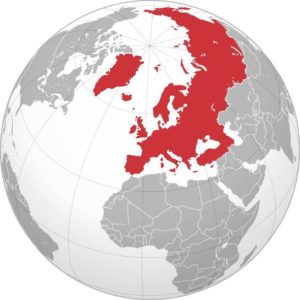 Europe is host to a wide and diverse population of people groups that stretch from Russia in the east to Portugal in the west. The modern configuration of nation-states might lead us to see a Europe in which the state as a unit corresponds to language and culture—but this is not the case. Within each country of Europe—France, Germany, Spain, Italy, etc—multiple people groups, languages and cultures are represented, including the indigenous minority language groups.
Europe is host to a wide and diverse population of people groups that stretch from Russia in the east to Portugal in the west. The modern configuration of nation-states might lead us to see a Europe in which the state as a unit corresponds to language and culture—but this is not the case. Within each country of Europe—France, Germany, Spain, Italy, etc—multiple people groups, languages and cultures are represented, including the indigenous minority language groups.
The following list details 12 different language affinity groups that form the focus of Linguæ Christi's work. The groups are largely based on linguistic family groups and as such they provide a natural framework for team-based, incarnational missions.
Celtic Languages
The Celts have often been heralded as the saviours of the Western world for the writings, traditions and practices they preserved and maintained during the collapse of the Roman Empire. Today they still inspire through contemplative “Celtic” Christianity as well as through the revival of pagan traditions. There are roughly 3,000,000 speakers of Celtic languages across three primary nation-states in Western Europe.
Ibero-Romance Languages
Millions of people speak indigenous minority languages across the Iberian Peninsula, stretching from Portugal in the west, across Spain, and into the southwestern regions of France. Both Catalan in the east and Galician in the west have speakers numbering in the millions individually with many other groups between them. The Basque language continues to puzzle linguists and historians who search for how it arrived in the western Pyrenees.
Italo-Romance Languages
All roads may lead to Rome, but nearly each one is guaranteed to pass through one of the Italo-Romance minority language groups on the way. From the Aosta Valley in the west to Venice in the east, northern Italy is full of diverse linguistic groups, some of which preserve Latinate forms that have disappeared in majority languages. Southern Italy is no exception and the outlying islands of Sicily, Sardinia and and the French province of Corsica each have their own language, some of which have multiple dialects. Although many Italians would call these languages “dialetti”, de-emphasising their uniqueness as separate languages, the importance of identity, language and the Gospel leads us to a different conclusion.
Germanic Languages
- Languages within this group:
- Nordic: Jamtlandic, Scanian, Jutlandic (Jutish), Faroese, Greenlandic
- Low/Platt Germanic LSG: Frisian (West, East, North, and Sater Frisian), West Flemish, Zeeuws, Achterhoeks, Drents, Gronings, Sallands, Low Saxon, Stellingwerfs, Twents, Veluws, Westphalien, Scots (including Ulster Scots)
- High Germanic: Limburgish, Luxembourgish, Pfaelzisch, Mainfränkisch, Kölsch, Bavarian, Cimbrian, Mócheno, Walser, Schwabian, Allemannic
(outside of Switzerland), Alsatian, Swiss German
- Countries where speakers live:
- Belgium, Denmark, France, Germany, the Netherlands, Luxembourg, Sweden, the United Kingdom
Gallo-Romance Languages
- Languages within this group:
- North: Norman (including Channel Islands varieties), Gallo, Picard, Wallon, Poitevin, and Saintgenais
- South: Francoprovençal, Occitan (Provençal, Vivaro-Alpine, Languedocien, Lemosin, Auvergnat, and Gascon-Aranese)
- Countries where speakers live:
- Belgium, France, Italy, Spain, the United Kingdom
Balto-Slavic Languages
- Languages within this group:
- Sorbian (Upper and Lower), Kashubian, Silesian, Rusyn, Belarusian, and Latgalian
- Countries where speakers live:
- Belarus, Croatia, Czech Republic, Germany, Hungary, Lativa, Lithuania, Poland, Russia, Serbia, Slovakia, Ukraine
Uralic Languages
- Languages within this group:
- Mari-Mordvin: Mari (Hill and Meadow), Erzya, and Moksha
- Baltic Finnic and Ugric: Karelian, Ludian, Veps, Võro-Seto, Khanty, and Mansi
- Permian: Udmurt, Komi-Zyrian, and Komi-Permian
- Samoyedic: Nenets (Forrest and Tundra), Nganasan, Enets, and Selkup
- Sami: Northern Sami varieties, and Southern Sami varieties
- Countries where speakers live:
- Estonia, Finland, Norway, Russia, Sweden
Altaic Languages
- Languages within this group:
- Mongolic/Tungistic: Buryat, Kalmyk, Even, and Nanai
- Urals and Central Turkic LSG: Bashkir, Chuvash, Khakas, Shor, Northern Altai, Southern Altai, Tatar, and Tuva
- Siberian Turkic - Other Siberian LSG: Siberian Tatar, Yakut, Chukot, Koryak, and Yupik
- Western and Caucasus Turkic LSG: Urum, Gagauz, Balkan Turkish, Karachay-Balkar, Crimean Tatar, Nogai, and Kumyk
- Countries where speakers live:
- Azerbaijan, Bulgaria, China, Finland, Georgia, Kazakhstan, Kyrgyzstan, Latvia, Lithuania, Macedonia, Moldova, Mongolia, Romania, Russia, Turkey, the United States, Ukraine, Uzbekistan
Caucasian and Indo-Iranian Languages
- Languages within this group:
- Kartvelian: Mingrelian, Svan, and Laz
- Northwest Caucasian: Kabardian, Adyghe, Abkhaz, and Abaza
- Northeast Caucasian: Avar, Archi, Bagvalal, Bats, Bezhta, Botilikh, Budukh, Tashkur, Chamalal, Dido, Karata, Khvarshi, Khinalugh, Akhvakh, Dargi (Dargwa), Lak, Lezgi, Tabassaran, Aghul, Rutul, Ingush, Chechen, Udi, Andi, Ghodoberi, Hunzib, Kryts, and Tindi
- Indo-Iranian: Ossetian, Khalaj, Talysh, and Tat
- Countries where speakers live:
- Armenia, Azerbaijan, Georgia, Iraq, Iran, Jordan, Kazakhstan Russia, Syria, Turkey
Jewish Languages
- Languages within this group:
- Yiddish and Ladino
- Countries where speakers live:
- Throughout Europe
Roma Languages
- Languages within this group:
- Central Romani: Baltic Romani, Carpathian Romani, Sinte, and Kalo-Finnish
- Balkan Romani
- Vlax Romani
- Mixed: Caló, Romano-Serbian, and Angloromani
- Countries where speakers live:
- Throughout Europe
European Sign Languages
- Languages within this group:
- French-Sign Family: Numerous Sign Languages
- Russian-Sign Family: Russian Sign Language, Georgian Sign Language, Lithuanian Sign Language, Ukrainian Sign Language
- Swedish-Sign Family: Swedish Sign Language, Finnish Sign Language, Portuguese Sign Language
- German-Sign Family: German Sign Language, Polish Sign Language
- Isolate Sign Languages: Numerous Sign Languages
- Countries where speakers live:
- Throughout Europe



